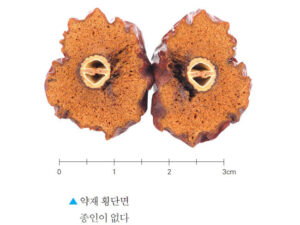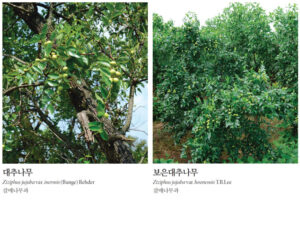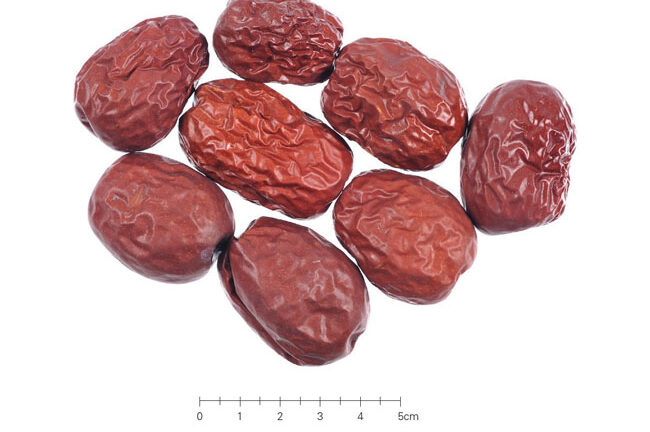Jujube Fructus (대조)
| Herb | Jujube, date |
|---|---|
| Latin name | Zizyphi Fructus |
| Scientific name | Zizyphus jujuba Miller var. inermis Rehder (대추나무), Zizyphus jujuba Miller var. hoonensis T. B. Lee (보은대추나무) |
| Origin | the ripe fruits of either Zizyphus jujuba Miller var. inermis Rehder or Zizyphus jujuba Miller var. hoonensis T. B. Lee |
| Properties | sweet (甘) and warm (溫) |
| Channels Targeted | the spleen (脾) and the stomach (胃經) meridians |
| Efficacy | 보중익기(補中益氣), 양혈안신(養血安神), 완화약성(緩和藥性) 건비익기(健脾益氣): a therapeutic method to treat spleen qi deficiency by using spleen-fortifying and qi-replenishing medicinals 양혈(養血): a therapeutic method to treat blood deficiency by using blood-tonifying medicinals, the same as to nourish or restore blood 안신(安神): a general term for tranquilizing measures |
| Administration | Decreased digestive function, low immunity, and fluid deficiency |
| Dosage | 2~12g |
| Suitable Constitution | lesser yin person(소음인) |
| Unsuitable Constitution | lesser yang person(소양인) |


Origin
Jujube Fructus, commonly referred to as 대조 in Korean, is derived from the ripe fruits of either Zizyphus jujuba Miller var. inermis Rehder or Zizyphus jujuba Miller var. hoonensis T. B. Lee, which belong to the Rhamnaceae family. These fruits are harvested in autumn and sun-dried for medicinal use.
Properties and Meridian Tropism
Jujube Fructus is sweet (甘) and warm (溫) in nature. It primarily affects the spleen (脾) and the stomach (胃經) meridians.
Efficacy
The use of Jujube Fructus enhances the spleen and stomach (補脾和胃), benefits qi and generates fluids (益氣生津), which is especially useful for individuals with weakened spleen and stomach qi. It harmonizes the nutritive and protective qi (調營衛), detoxifies the body (解毒), augments qi and nourishes the blood (補中益氣, 養血安神), and moderates the properties of other herbs (緩和藥性).
Indications
Jujube Fructus is indicated for individuals with decreased digestive function, low immunity, and fluid deficiency. It is primarily used to enhance the effects of other medicinal substances and is considered more of a dietary supplement than a standalone treatment. It is also beneficial for those with dryness in the body and weakened digestion due to illness.
Dosage
For consumption, 2-12 grams of sliced or diced Jujube can be steeped in boiling water to make a herbal tea. It can also be used as a sweetening ingredient in foods.
Side Effects and Safety
Jujube is generally safe and has minimal side effects due to its mild and sweet nature. However, individuals with robust digestion but who overeat, leading to damp accumulation and discomfort in the stomach area, should avoid it.
Principle Analysis (Key Prescriptions, Clinical Experience)
Jujube’s sweet taste strengthens the spleen’s qi and replenishes bodily fluids, making it an essential component in formulas like Guizhi Tang and Shizao Tang. In Guizhi Tang, it works alongside ingredients like cinnamon and ginger to regulate body sweat and fluid balance. Shizao Tang uses a substantial quantity of Jujube to counteract the toxicity of other components and preserve the spleen and stomach qi.
Suitable and Unsuitable Constitutions
Jujube Fructus is particularly beneficial for individuals with a cold spleen constitution (소음인) and may also be advantageous for those with Taiyin or Taiyang constitutions. However, it is not recommended for individuals of the Shaoyang constitution unless specifically indicated.
References
- KMCRIC 생약 up-to-date
- KIOM 본초감별도감 (사진)
- [본초학] 전국한의과대학 본초학공동교재편찬위원회
- [한의학대사전] 한의학대사전 편찬위원회
- [새로 쓴 사상의학] 유주열
- [동의보감]
- [본초비요 本草備要]
Disclaimers
The content provided here is for educational purposes and should not substitute for medical advice from a healthcare professional. Always seek the guidance of a medical professional for medical treatments.

